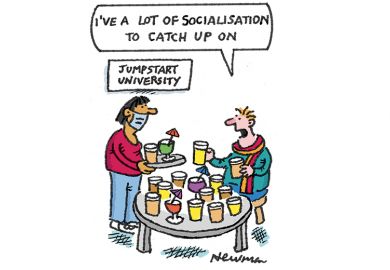
Stephen Toope’s decision to step down as vice-chancellor of the University of Cambridge has inevitably led to speculation about whether there was more to the news than his stated explanation of wanting to be closer to his Canada-based family. The Times reported that although this was “no doubt true”, it quoted sources claiming that Professor Toope had been affected by public rifts over free speech, including a row over software that students could use to allege racism and “micro-aggressions” by staff and other students. Graham Virgo, Cambridge’s senior pro vice-chancellor, said that Professor Toope had “of course” been “disappointed with some of the coverage” during his tenure “but that comes with the territory”, and dismissed the idea this had led to him leaving. He is also not the first expatriate vice-chancellor to have found international travel restrictions a serious hindrance to seeing family during the Covid crisis.
The University and College Union has expressed concern about the safety of its members who are returning to in-person teaching on UK campuses this term. So some were surprised to see its general secretary, Jo Grady, address a “packed room” on the fringes of this week’s Labour conference, as described by the union’s official Twitter account – which shared an image of an audience that did not appear to be socially distanced and looked largely unmasked. The image was met with dismay by some university staff who said that it “undermines the efforts of university lecturers to advocate for safer teaching environments during this continuing pandemic”. Many pointed out that it was “irresponsible” since UCU has been campaigning for universities to keep staff and students safe by requiring masks and distancing on campus.
A Chinese province has enlisted an unusual way to encourage graduates to stay local after they graduate: by offering them speed dating. It forms part of Anhui’s “marriage assistance project”, based around the idea that if students find a spouse locally, they will not leave for more prosperous regions. The proposal was drawn up after Li Yuyun, a dean at Bengbu Medical College and a member of an important state advisory body, mentioned the need to “help well-educated spinsters to get married as soon as possible and settle down”. As well as speed dating – some of it online – the province plans to publish magazines on topics such as love, marriage and family, and run a digital dating platform on the WeChat social media platform. It will also form a network of community workers and volunteers who “have in-depth knowledge about the single population in local households”, according to Chinese media.
The University of Glasgow was forced to issue an apology after it published a job advert for maternity cover that implied the original post holder was likely to resign. The advert – for a role in modern gender history – said that the institution was seeking someone “to cover maternity on a month-to-month basis up to nine months or until the substantive post holder returns from maternity leave, or in the event of her resignation, whichever date is earlier”. Glasgow has since “unreservedly” apologised “for the incorrect wording and for the understandable offence it has caused. The phrasing is not normal practice and in no way represents our values.” The amended job advert now only makes reference to the role being for “maternity cover”.
Vice-chancellors around the world often complain about governments exerting control over universities, either directly or indirectly through methods such as funding. But a former education minister in Malaysia has asserted that it is leaders’ acquiescence with government policy that is the issue in his country rather than state control. “Sometimes the problem is not with the state but with the academics themselves,” Maszlee Malik told a webinar organised by German thinktank Konrad Adenauer Stiftung Malaysia. “A lot – not a few, a lot – of our fellow academics kowtow to the regime at the expense of academic freedom.” As education minister in the Pakatan Harapan government from 2018 to 2020, Dr Maszlee, himself a former academic, did not fulfil his ambition to change laws in Malaysia that have been criticised for their restrictions to academic freedom and institutional autonomy. But even if such reforms had been achieved, they may not have resolved “self-censorship” by “non-productive intellects” whose main contribution was “parroting” other researchers, Dr Maszlee said.
Register to continue
Why register?
- Registration is free and only takes a moment
- Once registered, you can read 3 articles a month
- Sign up for our newsletter
Subscribe
Or subscribe for unlimited access to:
- Unlimited access to news, views, insights & reviews
- Digital editions
- Digital access to THE’s university and college rankings analysis
Already registered or a current subscriber? Login





